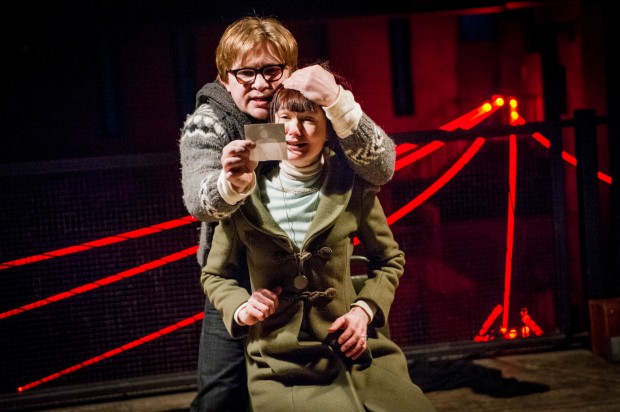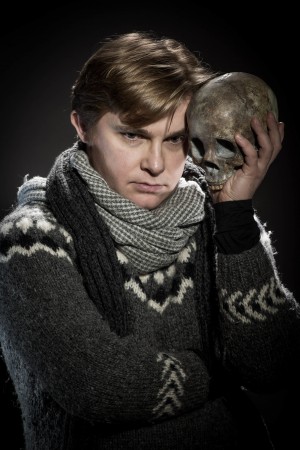You have no items in your cart. Want to get some nice things?
Go shopping
One of the unique and perhaps fundamental elements to the drama in Shakespeare’s Hamlet is a clear sense of the passage of time. The impact this has on the play’s protagonist is perhaps vital to the overall dramatic effect; as the story progresses Hamlet is seemingly immobilised, frustrated by an inability to enact the revenge demanded of him. The latest production at the Rose Theatre clocks in at a mere hour-and-a-half. As such, my primary concern was whether it would uphold this tension caused by the gradual unravelling of time. I was also concerned that key scenes would be cut, compromising the emotional impact of the story overall. It seems I needn’t have worried on this front, in fact I was impressed; this production retains all of the depth and profundity of the play as a whole, and the most important scenes are all present. Although Hamlet is here stripped to its bare bones, this nonetheless works effectively; the audience’s attention during this performance appeared to be captured throughout.
We are made well aware that something is “rotten in the state of Denmark” before the play even opens. An eerie atmosphere pervades Rebecca Brower’s set. Covering a small area, and comprising of just a few chairs, the sparsely furnished stage amply sets an atmosphere of unease; on one of the chairs sits a radio, which emits uncanny garbled and distorted sounds.
The radio turns out to be a crucial feature; it intriguingly functions as the mouthpiece through which the ghost of Hamlet’s father communicates to him and urges him on his revenge. This lends a whole new meaning to Hamlet’s utterance, “thou comest in such questionable shape” – drawing a few titters from the audience and somewhat alleviating the intensely disturbing nature of the conversation between Hamlet and the ghost. The radio also makes for an effective loudspeaker for Claudius’ stately pronouncements.
Martin Parr’s production successfully exploits the small space of the Rose’s stage, allowing for a very intimate relationship between the actors and audience. This is clear from the first scene, where we find Hamlet sitting in the audience, whilst Gertrude and Claudius occupy the stage. This also powerfully emphasises Hamlet’s disconnection from the world of the court and his antipathy towards Claudius. However, when it comes to the first soliloquy – “O that this too solid flesh would melt” – the intensity of Hamlet’s anguish feels lost somewhat by the very fact that he sits in the audience for much of it (for the latter half of the soliloquy, he does move onto the stage).

It seems there is something missing generally from Jonathan Broadbent’s portrayal of Hamlet, although I spent some time pondering just what this is. While Broadbent is technically proficient and captures the frustration and powerless anger of Hamlet well, he proves less capable in rendering the nuances and subtleties of Hamlet’s character. It is a conventional performance, bringing nothing radically new or innovative in his approach to the protagonist’s central dilemma.
Liam McKenna’s portrayal of Claudius proves to be the strongest. By playing both Polonius and Claudius, he brings fascinating insights to both characters. Polonius is usually dismissed as a simple buffoon by critics, but when warning Ophelia not to give in to Hamlet, McKenna grants him a level of tyranny and cruelty that is refreshing to see. He reminds us that Polonius should not merely be seen as the fool of the play. Parr’s choice to “double” Claudius and Polonius for this production highlighted the disturbing undertones in Polonius’ nature, in his dictatorial manner with Ophelia.
Despite the fast-moving nature of this production, it takes a very traditional approach to Hamlet. Whilst the radio was a nice touch, it ultimately does little to draw out the multi-faceted complexity of the play. Overall this production plays it fairly safe. Even the “bedroom scene” is here played without any sexual overtones as it can be, and has been, to scandalous effect in other productions.
The ending of the play is performed differently to Shakespeare’s original denouement. Although this is one of the few innovative touches of this production, it is one that I think fails. As such the concluding scene proves ultimately lacking in emotional power. Instead of Hamlet facing up against Laertes in a sword fight, they play against each other at cards. The loser in the card game has to take a shot; and, as it turns out, all of the shots are poisoned. Hamlet and Laertes fling shots in each other’s faces in the heat of their card-playing, resulting in them both getting poisoned. I struggled to understand the rationale of changing the last scene in this way. It seems that this deflates the tension that would otherwise be at bursting point had Hamlet and Laertes duelled as they should.
The removal of Horatio from the play is also, I think, misguided. Although some may consider him a minor character, he does in fact play a crucial role in elevating the play’s dramatic ending and in leaving us with a befitting tribute to Hamlet. Horatio’s tribute traditionally alleviates the violence and bloodshed of the final scene. We need a reminder of Hamlet’s nobility of spirit as the play closes; we need to be left on his side. Subsequently this production at the Rose falls significantly short. The omission of Hamlet’s friend and confidant, alongside the trivialisation lent to the ending, means that ultimately the tragedy of Hamlet’s downfall is sadly foregone.
Hamlet is performing at the Rose Theatre, Bankside, until the 3rd March. For more details and ticket information, visit the website.

About Ana Malinovic
Ana graduated from Warwick University with a BA in English and American Literature in 2010. Her dissertation was centred on dystopian elements in the fiction of Kafka. She enjoys uncovering innovative works of fiction by a diverse range of authors. She also spends much of her time roaming around London's arts and culture scene overexcitedly. Check out her blog





Ana Malinovic reviews Hamlet @rosetheatrebank for Litro, which pleases & perplexes in equal measure. https://t.co/BuLGJp33KP